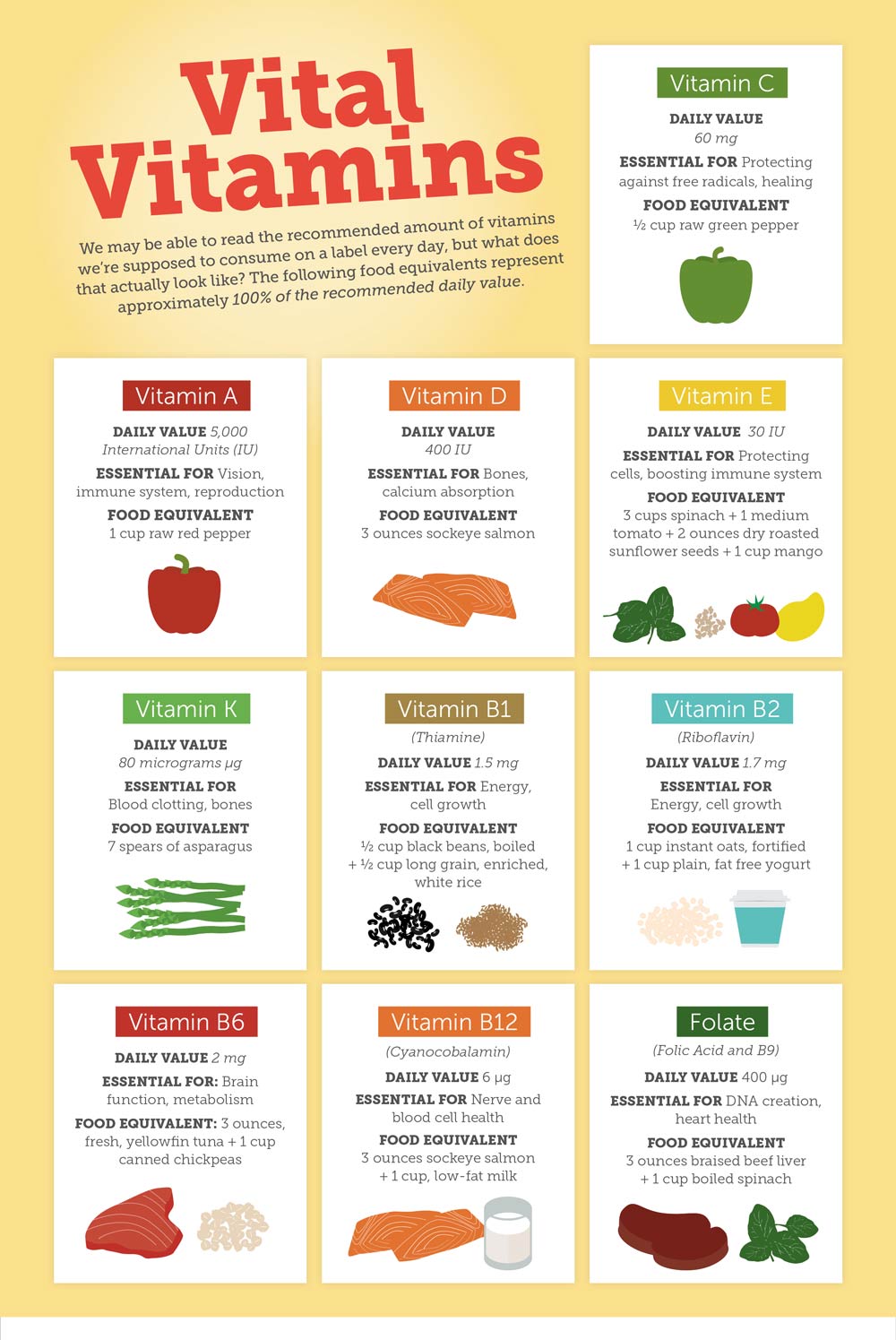
10 Essential Vitamins Sourced from Food – Immunity Booster, Growth & Health
Vitamins are essential ingredients of food. They assist carbohydrates, fats, proteins and other nutrients to promote various chemical processes, increase energy, replace and build cells and to arouse phagocytes. For maintaining good health vitamins serve as protective foods. Following vitamins have, so far, been isolated.
Vitamin- A : Its deficiency results in lack of appetite, night blindness, retarded growth, unhealthy skin, dental loss, health depleted vitality and general growth. Its natural sources are fruits, vegetables, egg yolk, milk and its products, liver oil and liver of animals. In normal health one requires 5000 I.V. daily but in pregnancy and for lactating (nursing) mothers 8000 I.U. will do because its deficiency can lead to deficiency in milk secretion.
Vitamin- B-1 (Thiamine) : Thiamine deficiency leads to depressed mental states, nervous irritation, weight loss, tickling sensation in the soles. It is of paramount importance for functions of muscles, nervous system, digestion, for promoting utilization of carbohydrates. Its daily normal requirement is 1.25 mg. It is derived from natural sources like pea-nuts, oat-meal, milk, rice husk, brewer’s sources like pea-nuts, oat-meal, milk, rice husk, brewer’s yeast, meat, liverete.
Vitamin- B-2 (Riboflavin) : It promotes growth and general health, is useful for fine conditions of skin and eyes, helps body cells in using oxygen for release of energy from food and its deficiency may result in cracking of lip-corners and burning itching of eyes. Its natural sources are milk and its products, whole grains, meat, liver and various foods. Its daily requirement, for a normal person, is 150 mg.
Vitamin- B-6 (Pyridoxine) : Its presence is essential in adding assimilation of proteins and fats, in blood building for normal functioning of brain, muscles and nervous system, loss of hair, skin eruptions, loss of muscular control, etc. Milk banana, raisins, molasses, wheat germ, brain brewer yeast, kidney liver, fish, eggs, meats are natural sources of vitamin B-6. Its daily requirement is 2.0 mg.
Vitamin- B-12 (Cobalamin) : It helps in promoting growth of children helps as a general tonic for the aged persons, in regenerating and forming R.B.C.s (Red Blood Corpuscles), nerve tissue and also in utilization of carbohydrates, fats and proteins. Its deficiency often leads to lack of proper growth inflammation of tongue, fatigue and anaemia. Its natural sources are eggs, liver, meats, milk products, etc. Its daily requirement is 6.0 mgm daily, in normal course.
Vitamin- B-5 (Pantothenic acid) : Deficiency of this vitamin is often not found but, when it occurs, it may cause dizzy spells and disturbance in digestion. It is considered necessary for synthesis of antibiotics, nervous and digestive systems. Its natural sources are brain, whole wheat, brewer’s yeast, molasses, peas, kidney, liver etc. For daily requirements 10 mg would suffice.
Vitamin- C (Ascorbic Acid) : It builds up general resistance of the body enabling the latter to fight infection, apart from hastening heeling. It is essential for healthy bones, teeth and gums, maintains vigor and good health, in restricting coughs, colds and sneezing.
Its deficiency can lead to anaemia, bleeding from piles, lack of general resistance etc. All citrus fruits are its major sources as also amla, mango, lime, lemon, tomatoes, potatoes, peppers, spinach and other vegetables and fruits. If stored or cooked, it is liable to be destroyed. Its daily normal requirement is 60 mg but may be required in case of smoking, incessant sneezing and coryza, it may have to be increased to 500 mg daily, depending on severity and gravity of the case.
Vitamin- D (Calciferol) : It helps in the formation of bones and teeth for utilization of phosphorus and calcium. Its deficiency leads to rickets in infants and children. In pregnancy puffiness and swelling of feet, etc. indicate its deficiency, caused by malabsorption of calcium.
Ultraviolet rays help to convert cholesterol, present in the skin, to calciferol. Its natural sources are milk, milk products, oil of fish’s liver. Its daily requirement, for a normal person, is 400 I.U. But higher dosage is required in pregnancy. Should never be used without medical advice and care.
Vitamin- E (Tocopherol) : It helps in prevention of undesirable blood clots, and promotes formation of new skin (in the women). Its deficiency can lead to early aging, muscular disorders, loss of reproductive capacity. It is essentially required when location supplements are taken.
Its natural sources are wheat germ, grain and its products, leaf and green vegetables, margarine, vegetable oils, liver, eggs and butter and its daily requirement is 30 I.U. if the situation demands. As for its importance, only vitamin C can live with it.
Vitamin-K (Menadione) : It assists in maintaining the clotting system of blood. But for this vitamin and its capability from clotting in blood, even a simple injury could have led to fatality. For health and efficient working of the liver it has an important part to play.
It is found in wheat brain, wheat germ, tomatoes, cabbages, potatoes, spinach, liver and egg-yolk. Bacteria hardly needs to be supplemented, but its use and importance cannot be overlooked or denied.

Best source is to extract vitamins from vegetables and fruits and tablets or tonics should be taken only when the body is unable to extract vitamins from natural foods. All vitamins, falling under the B-complex category, are water-soluble and thus, are drained out by system. If too many vitamins are taken continuously for longer periods. It may render our body incapable of drawing vitamins from natural foods.






